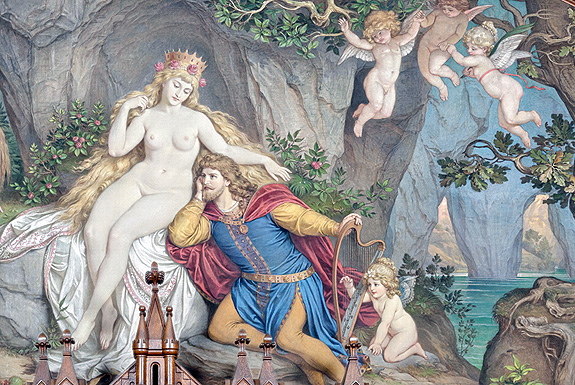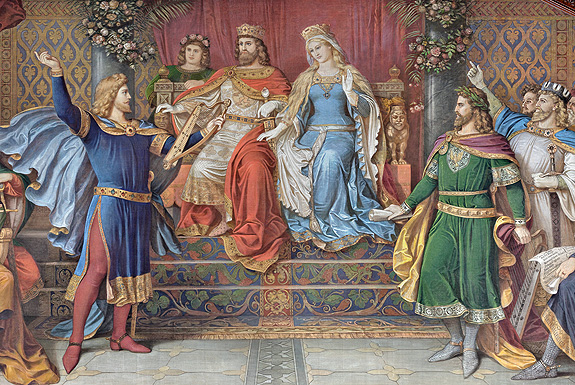Idea and History / Sagas > Tannhäuser
Main information:
Idea and History
Sagas: Tannhäuser
The murals in the Study deal with the Tannhäuser saga.

Tannhäuser in the Venus grotto.
Mural in the Study by Josef Aigner
Photo: MESSBILDSTELLE GmbH, Dresden
During the rule of the Hohenstaufen emperors, the art of the minnesingers flourished. The knight Tannhäuser travels as a singer from castle to castle and sings his songs in praise of female beauty and chaste love, the clash of weapons and the disputes of men. Beautiful women and noble gentlemen love his songs, but Tannhäuser has a general reputation for wayward living. On his travels he arrives at the Wartburg, the castle belonging to the landgrave Hermann in Thuringia, where knightly singers compete for the prize which is presented to the winner by Elisabeth, the landgrave's charming niece. The inhabitants of the castle listen entranced to Tannhäuser's singing. When he sings of courtly, true love, the beautiful Elisabeth believes he is praising her alone. She is right: the singer has fallen in love with her, but this also plunges him into deep despair: Tannhäuser knows that as a poor knight he could never marry the niece of the landgrave.
When the next singers' contest takes place, the most famous singers of the day come from far and wide to compete for the prize – among them Walther von der Vogelweide, Reimar Zweter and Heinrich von Ofterdingen. However, as the guests are summoned to the banquet, the company waits in vain in the dining hall for the singer Tannhäuser, who has left without a word and is wandering lovesick through the forests of Thuringia. Suddenly a black-clad stranger, Klingsor, stands before him. Tannhäuser tells him why he is suffering, and Klingsor replies, "She is not for you, Tannhäuser. Your heart requires finer fare and more sensual pleasure. The beautiful Elisabeth, they say, is already a living saint". But Tannhäuser replies that he wants to sing songs of courtly love and not cheerful, boisterous melodies. Tannhäuser is shocked by Klingsor's scornful laughter. Suddenly the mountain opens before his eyes. A bright light streams from within and girlish forms of unearthly beauty call to the knight and entice him with enchanting voices. Klingsor has vanished, and in his place is an aged pilgrim, the faithful Ekkehard. He warns Tannhäuser of the grotto. The mountain is the Hörselberg, which houses the realm of the infernal goddess Venus. Tannhäuser tries to heed the warnings, but is overcome by the enticing apparitions. He has also forgotten his love for the beautiful Elisabeth. An irresistible force draws him into the realm of the goddess, who receives him with open arms on a fragrant couch strewn with roses.

Singers' Contest at the Wartburg.
Mural in the Study by Josef Aigner
Photo: MESSBILDSTELLE GmbH, Dresden
Elisabeth longs for her beloved singer, who has vanished without a trace. The landgrave summons the most famous singers in Germany for the contest, and hopes that Tannhäuser will also appear at the Wartburg. For a year Tannhäuser enjoys the pleasures of the realm of Venus, but finds no peace there. All he feels is aversion and disgust. His heart is full of regret for what he has done. He does not want to stay any longer in the enchanted mountain. Venus does not want her lover to go and finally makes him promise "to return to me, if you find no salvation from your sins!" Then she puts him into a deep sleep. When Tannhäuser awakes, he is lying on the ground in the forest. He tries to atone for his sins, but is condemned by church and monastery alike. By chance he finds his way to the Wartburg for the singers' contest. No-one yet knows what has happened to the gifted minnesinger in the meantime.
When it is Tannhäuser's turn, he is suddenly overcome with memories of his experiences in Venus' enchanted mountain. Instead of singing of spiritual love, he sings of the merits of sensual love, which seeks only bliss and instinctive pleasure. He boldly accuses the minnesingers of being "poverty-stricken, with your virtuous words, for you have never experienced love! If you want to know what it is really like, go to the mountain of Venus!" The landgrave is only just able to calm down the enraged audience. Elisabeth pleads for Tannhäuser's life. He goes as a poor pilgrim to Rome, but is condemned by the Pope. "Anyone who has erred like you is damned to all eternity", says the Holy Father, harsh and unbending. "See this crook, which I carry. This dead wood will sprout leaves before you are saved from your sins".
With these words the Pope drives his crook into the earth of his garden. Bereft of all hope, Tannhäuser departs. Three days later, the Holy Father sees that the dead stick is covered with shoots and budding leaves. A miracle has happened: God has shown that he forgives the repentant sinner. In vain the Pope's servants search for the pilgrim. Tannhäuser drags himself in his despair over the snow-covered passes of the Alps in the direction of home. Full of feverish longing, he steers his steps towards the Hörselberg, where Venus once received him in love. The search for Tannhäuser is in vain. Peasants in the fields below the Wartburg may have seen a pilgrim hastening past. But nothing more is ever heard of the unhappy Tannhäuser.


Facebook Instagram YouTube